
Email Newsletters
Sign up for our email newsletters to get customized updates on new Berghahn publications.
Towards Emancipation
German Women Writers of the Nineteenth Century
Carol Diethe
192 pages, 6 photos, bibliog., index
ISBN 978-1-57181-932-1 $135.00/£104.00 / Hb / Published (January 1998)
ISBN 978-1-57181-933-8 $29.95/£23.95 / Pb / Published (January 1998)
Reviews
"... a long-overdue book ... offers an interesting introduction that will be useful for students as well as for academics ... demonstrates the richness and diversity of women's nineteenth century, its ambiguities and conflicts." · Modern Language Review
"... a useful handbook for a field very much in need of attention." · Signs: Journal of Women in Culture and Society
"... a useful resource of factual information for future researchers in the field of women's writing." · Ten Years Work in Modern Language Studies
"... nothing critical can be said about this delightful collection [of portraits]." · Women in German
Description
No doubt, the feminist movement has come a long way, even though many of its aims have not been realized or, in fact, are still debated by its supporters and critics. It is sobering andinstructive to look back and examine the aspirations, achievements and failures of women of earlier generations, especially in the nineteenth century, on which subsequent generations of women have built. Although Germany has produced some famous and influential women writers and thinkers, no recent study exists that analyzes their work in a systematic way. This book fills the gap by discussing some of the major writers in the nineteenth century, beginning with late-Romantic writers, such as Bettina von Arnim and Johanna Schopenhauer, and goes on to discuss writers who were active in the 1848 Revolution such as Malwida von Meysenbug and Johanna Kinkel. With regard to the idea of emancipation the attitudes of mainstream writers examined range from lukewarm, such as the enormously popular Marie von Ebner-Eschenbach and Gabriele Reuter, to downright hostile, such as Lou Andreas-Salomé and Franziska zu Reventlow. The heart of the book is devoted to the leading proponents of emancipation, HedwigDohm, Helene Böhlau, and the prolific Louise Otto-Peters.
Carol Diethe (1943-2025) was Reader in European Cultural History at Middlesex University.
